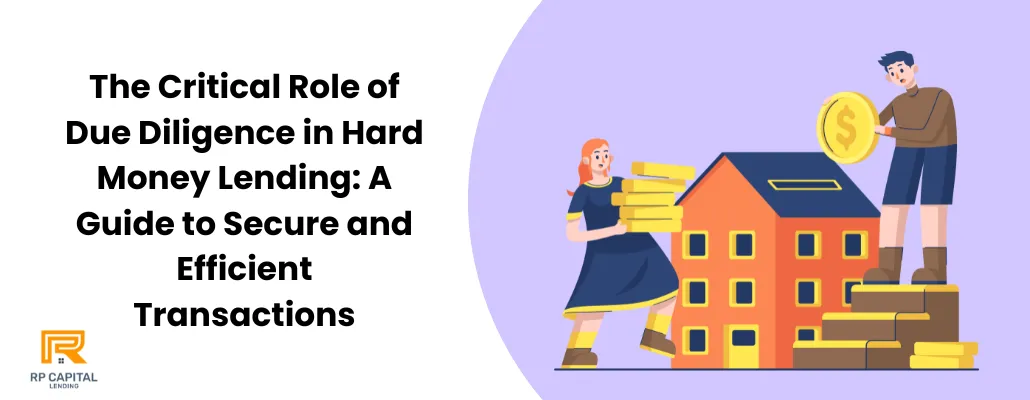Blog

The Critical Role of Due Diligence in Hard Money Lending: A Guide to Secure and Efficient Transactions
In a financial landscape brimming with opportunities and risks, the path to a successful hard money lending transaction is paved with diligence and caution. The allure of quick funding and flexible loan terms can often overshadow the critical need for thorough due diligence. Yet, the savvy investor knows that the key to a smooth and secure transaction lies in a deep understanding of the due diligence process. This comprehensive guide illuminates the importance of due diligence in hard money lending, ensuring your journey is both profitable and well-informed.
Introduction: The Beacon of Financial Prudence
"Embark on your investment journey with confidence, knowing that due diligence is your guiding light through the tumultuous seas of hard money lending." This statement isn't just a compelling hook; it encapsulates the essence of successful investing. Due diligence stands as the cornerstone of informed decision-making, safeguarding your investments against unforeseen risks and complications.
Understanding Due Diligence in Hard Money Lending
Due diligence in hard money lending involves a meticulous evaluation of all aspects of the lending deal. It encompasses the assessment of the borrower's creditworthiness, the value and condition of the collateral property, and the overall risk associated with the loan. This process is crucial for lenders to mitigate risks and for borrowers to understand the terms and implications of the loan.
Why Due Diligence is Non-Negotiable
Risk Management: It identifies potential risks, allowing lenders and borrowers to make informed decisions.
Legal Compliance: Ensures all parties comply with state and federal regulations, avoiding legal complications.
Financial Assessment: Evaluates the borrower's ability to repay the loan, protecting the lender's investment.
Property Valuation: Assesses the value and condition of the collateral, ensuring it covers the loan amount.
Transparent Transactions: Promotes clarity and trust between lenders and borrowers, leading to smoother transactions.
The Pillars of Due Diligence in Hard Money Lending
Borrower Evaluation: This includes assessing the borrower's credit history, financial stability, and investment track record. Though hard money loans are primarily asset-based, a reliable borrower indicates a lower risk of default.
Property Assessment: A detailed evaluation of the property's market value, condition, and potential for appreciation. This step is crucial for determining the loan-to-value (LTV) ratio.
Legal Scrutiny: Ensuring that the property and the loan transaction adhere to all relevant legal requirements, including zoning laws and tax obligations.
Financial Analysis: Reviewing the loan terms, interest rates, and repayment plan to ensure they are fair and manageable within the project's financial framework.
Exit Strategy Evaluation: Understanding the borrower's plan for loan repayment or refinancing is vital for assessing the feasibility of the loan.
Streamlining the Transaction Process Through Due Diligence
Clear Communication: Establishes expectations and responsibilities, reducing misunderstandings.
Efficient Risk Assessment: Quickly identifies deal-breakers, saving time and resources.
Building Trust: Transparency in the due diligence process builds a strong foundation for trust between the lender and borrower.
Faster Decision Making: With all necessary information at hand, decisions can be made swiftly, accelerating the lending process.
Preventing Future Disputes: Thorough due diligence minimizes the chances of disputes over the loan terms or property issues.
FAQs About Due Diligence in Hard Money Lending
Q1: How long does the due diligence process take in hard money lending?
The duration can vary significantly, ranging from a few days to several weeks, depending on the complexity of the loan and the thoroughness of the evaluation.
Q2: Can I skip due diligence if I'm in a hurry to secure funding?
Skipping due diligence is highly discouraged. While it might expedite the funding process, it significantly increases the risk of investment loss or legal complications.
Q3: What happens if due diligence uncovers a problem with the property?
If issues are found, lenders and borrowers can renegotiate the loan terms, address the problems, or in some cases, terminate the deal to avoid potential losses.
Q4: Who is responsible for conducting due diligence?
While the lender typically leads the due diligence process, borrowers are also encouraged to conduct their own due diligence to fully understand the terms and risks of the loan.
Q5: Does due diligence guarantee a successful hard money loan transaction?
While due diligence significantly reduces risks and promotes a smooth transaction, it does not guarantee success. Market conditions, borrower circumstances, and other external factors can still impact the outcome.
Conclusion
In conclusion, due diligence in hard money lending is not just a procedural step; it's a strategic approach to secure and efficient transactions. By embracing a thorough due diligence process, lenders and borrowers alike can navigate the complexities of hard money lending with confidence and clarity. This guide aims to serve as your beacon, illuminating the path to successful investments and fostering a deeper understanding of the critical role due diligence plays in the world of hard money lending.
Disclaimer: Loans only apply to non-owner occupied properties. Rates, terms and conditions offered only to qualified borrowers, may vary upon loan product, deal structure, other applicable considerations, and are subject to change at any time without notice.
Copyright © 2025. All Rights Reserved.


